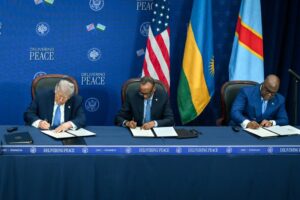
The RMAFC agitation for salary increase of public officers is hollow, argues IFEANYICHUKWU AFUBA
Do members of the Revenue Mobilisation and Fiscal Allocation Commission (RMAFC) live in the moon? Are they on a leisure cruise in some Caribbean island, beckoning with long, surfing beaches, whistling coconut trees, soft samba tunes, fish barbecue, and Irish cream? Are they conscious of their Nigerian surrounding and time? Are they able to see the reality around them? Can they distinguish between light, mirage and illusion? Do they feel this numbness that comes with sedatives? If it’s not exactly a matter of fantasies, have they fallen into a long dream of obsessions? Obsession with the grandeur of political office. Pray, what is their perception of public office? A call to serve or a call to luxury at tax payers’ expense? Indeed, it was a few years ago that a minister in Obasanjo’s presidency admonished late Bola Ige, Minister of Power, appointed from an opposition party, of abusing the invitation extended to him to come and “eat.”
These concerns are driven by the latest move of the RMAFC to jerk up the remuneration of elected and other political office holders in the country. The last attempt to push through an improved political pay package in the last quarter of 2023 mercifully failed. Two years on, as the mass of Nigerians bear the pangs of hunger, the commission is once more about to award stupendous salaries to public servants of political extraction. According to Punch newspaper, August 19, 2025, the revenue agency leadership dismissed current emoluments of political office holders as a joke.
“At a press briefing in Abuja on Monday, RMAFC Chairman, Mohammed Shehu, disclosed that President Bola Tinubu presently earns N1.5m monthly, while ministers receive less than N1m — figures that have remained unchanged since 2008.
You are paying the President of the Federal Republic of Nigeria N1.5m a month, with a population of over 200 million people. Everybody believes that it is a joke.
You cannot pay a minister less than N1m per month since 2008 and expect him to put in his best without necessarily being involved in some other things. You pay either a CBN governor or the DG ten times more than you pay the President. That is just not right. Or you pay him [the head of an agency] twenty times higher than the Attorney-General of the Federation. That is absolutely not right.” The chairman evaded the burden of disparity between the national minimum wage and the fattened pay for the political class.
“We are strictly restricted to political office holders, governors, senators, legislators, ministers, DGs, and other people.”
The case made by the commission is hollow. I doubt if members of the RMAFC and the political community they speak for are themselves convinced by this shade of filibustering. The commission’s approach to the subject matter is largely of deflection. It seeks to parry the core issues with a focus on hierarchy. But even by the administrative imperative the Commission swears, the salary increase she proposes, does not pass the test of scrutiny. Some cards that ought to be on the table have been withheld by the activists of selective jumbo pay. It’s disingenuous not to make a distinction between basic salary and take – home pay. The Commission set out to mislead Nigerians by presenting the salaries of the President and Ministers without publishing the allowances and convertible benefits attached to the offices. The President and Governors cited by the Commission’s leadership as deserving of pay raise are fully catered for by the State. Their feeding, healthcare, travels, etc., are underwritten by respective governments. Ministers are partially entitled to some of these privileges. They also receive a bagful of allowances, including pampering wardrobe and kitchen support! There is the mouth – watering severance paid to all political office holders at the end of a tenure. And there is the lavish pension scheme for former governors and deputy governors operated by some States.
With regard to legislators it would be apposite to first, observe the controversy surrounding their exact remuneration. Following widespread perception that legislators self – awarded some of their lavish remuneration, a number of activists took the matter to court. Delivering judgement in one of the cases, Justice Chuka Obiozor of Lagos High Court pronounced that it was unconstitutional for the National Assembly to fix it’s salaries (The Guardian, June 22, 2021.) Two years later,
former Senator, Shehu Sani, revealed that a Senator’s take-home was N13.5m a month. Reacting to Sani’s disclosure, Mohammed Shehu, chairman of RMAFC, issued a statement that stopped short of a disclaimer. The statement read in part:
“I wish to state that RMAFC does not have constitutional powers to enforce compliance with proper implementation of the Remuneration package. This lacuna is, however, being addressed by the National Assembly.” The lacuna, which the legislature is suspected of exploiting to it’s undue advantage, is to be remedied by the same benefitting legislature! In any case, the monetised constituency project, alone, which run into tens of millions per constituency, is an empowerment windfall. These groups of privileged Nigerians are the ones the RMAFC is insisting deserve further pay raise.
A year later, the stakes had risen considerably. On 14 August, 2024, Senator Kawu Sumaila reportedly told the BBC Hausa Service that he received N21.6m monthly, which sum included office running cost. Following the insistence of the Commission on fattened pay for the political class, a comparative analysis
recently came up. The study, widely published in the media showed that 109 senators’ monthly bill of N2.3b will pay the salary of 4,708 professors! Today, the national minimum wage cannot buy a full bag of rice. At the beginning of this same month of August, the distinguished writer, Chimamanda Adichie, lamented that Nigeria’s middle class now beg to survive. As if corroborating Adichie, The Punch of August 27, 2025, quoted immediate past Vice Chancellor of Unilag, Professor Oluwatoyin Ogundipe as saying that in the last seven years, “239 first – class lecturers quit Unilag over poor pay.”
The RMAFC has proved a major contributor to Nigeria’s governance crisis. The fiscal authority has been selective and self – serving in the discharge of it’s constitutional mandate
under the Third Schedule, Part 1 of the 1999 Constitution (as amended).
Sets of RMAFC administrations from 1999 to date consistently harboured the palace mentality to issues of political office holders’ remuneration.
The RMAFC authorities have religiously ignored public outcry over unacceptable high earnings of elected officials and political appointees while glossing over the plight of States in the revenue allocation system. Yes,
the Constitution mandates the Commission to determine remuneration appropriate for political office holders. Did the Constitution say that the remuneration of political office holders must be excessively higher than those of other public servants? Why have we seen only upward reviews of salaries by the Commission? Why hasn’t any of the RMAFC regimes ever proposed reduction in the earnings of political office holders? Before this latest maneuver, the RMAFC about September 2023, had launched a failed bid for pay increase for political office holders.
This was at a time the national minimum wage of N30,000 could not buy a bag of rice.
The policy of jumbo pay for elective and appointive positions being implemented by RMAFC is at odds with the essence of public service. Government is not a place to go and make money. It’s
neither an estate for luxurious living. Government exists primarily for the welfare of all citizens; not for the indulgence of a tiny minority. In advanced societies, people mostly join government to execute “ideological” programmes or render professional services. Remuneration is hardly the incentive. Those who want to make money go to the private sector.
Global best practices aims at cutting down cost of governance. Development – driven policies emphasise lean recurrent expenditure. Budgetary allocation in favour of development projects remains the path to economic growth. But, here, we seem to be stuck with the orientation that views government as a mix of royalty and investment.
This practice is in effect, a declaration that the ruling elite are lords, rather than servants of the people.This sense of entitlement goes a long way in propelling a tradition of financial reward.
We cannot but stress on the negative ripple effects of such luxurious conditions of service.
The first fallout is obvious. You see it in the fierce battles to win elections. Electoral contests become more expensive and prone to violence. Vote buying was a common feature of the by elections in 12 states on 16 August, 2025. And a number of past elections as well.
The second notable result is not so obvious but it’s a strong influence all the same. When you see associations like ASUU and NMA adamant on their demands on government, this is where they’re coming from – the logic of precedent rule. Government’s plea of insufficient resources to meet demands of trade unions is discountenanced in the face of provisions for the political class. And the system suffers from the effect of prolonged strikes.
The leadership of RMAFC is invited to emulate the bold step of Anambra State Governor, Professor Chukwuma Soludo, who on assumption of office cut the salaries of political appointees by 25 percent.
Anambra is among the States with the lowest remuneration for political office holders. Every progressive Nigerian gives kudos to Soludo for that singular act because it sends a clear message that public office is an invitation to work, not to come and eat.
Nigerians should demand citizen – centred performance from RMAFC to facilitate good governance and development.
Afuba writes from Awka, Anambra State





